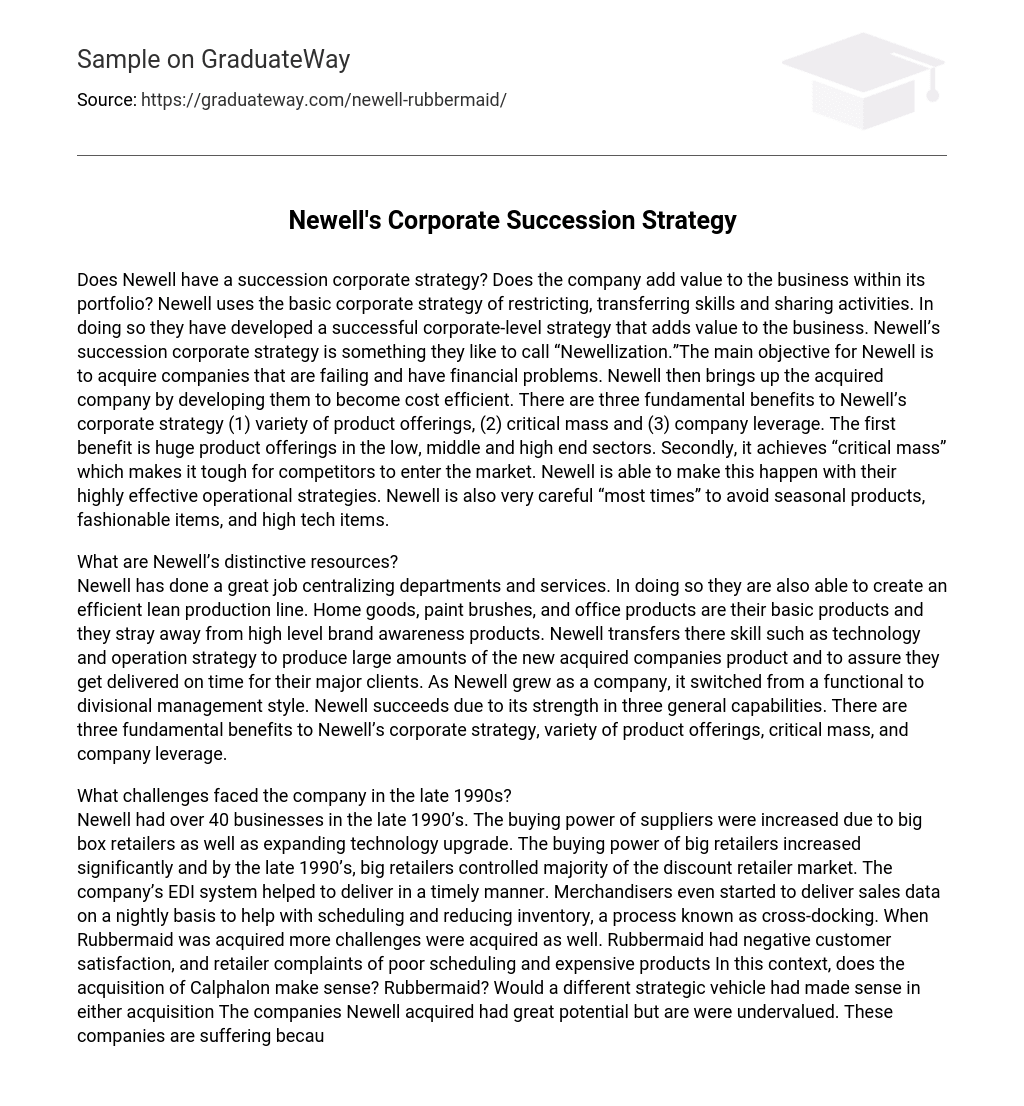Does Newell have a succession corporate strategy? Does the company add value to the business within its portfolio? Newell uses the basic corporate strategy of restricting, transferring skills and sharing activities. In doing so they have developed a successful corporate-level strategy that adds value to the business. Newell’s succession corporate strategy is something they like to call “Newellization.”The main objective for Newell is to acquire companies that are failing and have financial problems. Newell then brings up the acquired company by developing them to become cost efficient. There are three fundamental benefits to Newell’s corporate strategy (1) variety of product offerings, (2) critical mass and (3) company leverage. The first benefit is huge product offerings in the low, middle and high end sectors. Secondly, it achieves “critical mass” which makes it tough for competitors to enter the market. Newell is able to make this happen with their highly effective operational strategies. Newell is also very careful “most times” to avoid seasonal products, fashionable items, and high tech items.
What are Newell’s distinctive resources?
Newell has done a great job centralizing departments and services. In doing so they are also able to create an efficient lean production line. Home goods, paint brushes, and office products are their basic products and they stray away from high level brand awareness products. Newell transfers there skill such as technology and operation strategy to produce large amounts of the new acquired companies product and to assure they get delivered on time for their major clients. As Newell grew as a company, it switched from a functional to divisional management style. Newell succeeds due to its strength in three general capabilities. There are three fundamental benefits to Newell’s corporate strategy, variety of product offerings, critical mass, and company leverage.
What challenges faced the company in the late 1990s?
Newell had over 40 businesses in the late 1990’s. The buying power of suppliers were increased due to big box retailers as well as expanding technology upgrade. The buying power of big retailers increased significantly and by the late 1990’s, big retailers controlled majority of the discount retailer market. The company’s EDI system helped to deliver in a timely manner. Merchandisers even started to deliver sales data on a nightly basis to help with scheduling and reducing inventory, a process known as cross-docking. When Rubbermaid was acquired more challenges were acquired as well. Rubbermaid had negative customer satisfaction, and retailer complaints of poor scheduling and expensive products In this context, does the acquisition of Calphalon make sense? Rubbermaid? Would a different strategic vehicle had made sense in either acquisition The companies Newell acquired had great potential but are were undervalued. These companies are suffering because they do not have major clients. The overhead costs on these organizations are also high. As Newell acquires these companies, they share their activities and costs with a major company reducing its cost and increasing revenue and profits.
The acquisition of Calphalon was great. This was not their typical acquisition and is actually very surprising. This acquisition gave them a chance to enter into a new market exposure. Acquiring Calphalon allowed them to target the 25 – 35 demographic market. This diversified their portfolio as well as developed a partnership with Target providing them with the Product line. The acquisition of Rubbermaid was not as great of an acquisition. This was the largest acquisition that Newell had ever done. This acquisition was not as great an acquisition as Calphalon. Rubbermaid and Newell had very different strategies and products. One focused on cost the other on innovation. Innovation was not Newell focus. A different stagey vehicle would have made more sense in the acquisition of Rubbermaid. With this being such a large purchase Newell should have taken more time to examine the deal instead of being so hasty. And now Newell finds itself trying to transform such a large company.





